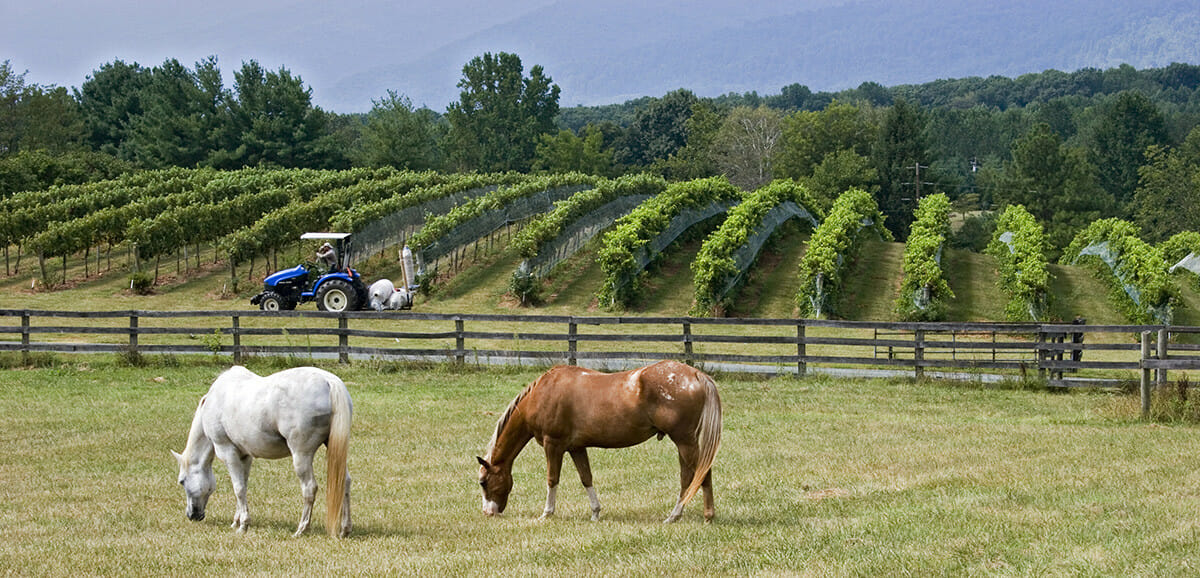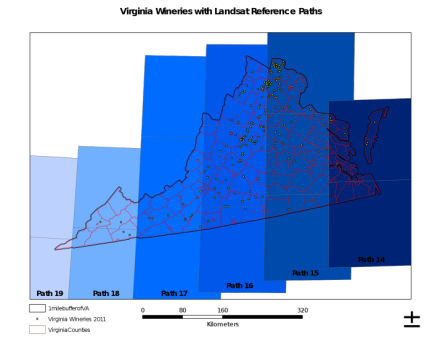NASA’s Earthbound Endeavors in Agriculture
In Virginia, NASA DEVELOP recently completed two projects in conjunction with the state government. The first looked at water efficiency in the state's agricultural sector while th...
NASA’s Earthbound Endeavors in Agriculture
In Virginia, NASA DEVELOP recently completed two projects in conjunction with the state government. The first looked at water efficiency in the state's agricultural sector while th...

In Virginia, NASA DEVELOP recently completed two projects in conjunction with the state government. The first looked at water efficiency in the state’s agricultural sector while the second was designed to help with the growth of the state’s wine industry.
The water project, “Coastal Mid-Atlantic Water Resources III,” used two of NASA’s satellites in conjunction with aerial drones to provide groundwater observations within the state’s coastal aquifer region and also looked at the water usage of crops at the surface level, according to Michael Finneran, a media representative for NASA’s Langley Research Center in Hampton, Virginia.

They were able to estimate evapotranspiration (the sum evaporation from the land surface plus transpiration from plants) using NASA’s Landsat 8 satellite, which will help them get a better understanding of how often farmers need to irrigate their fields. The goal is to decrease water waste and lower costs, according to Finneran.
A second project, “Virginia Agriculture II,” a collaboration between NASA and the Virginia Wine Board, which is part of the state Department of Agriculture and Consumer Services, mapped all the acreage of the state’s vineyards with the help of NASA satellites.
The state’s wine industry generates about $750 million a year. It supports close to 5,000 jobs and is one of the fastest growing agricultural sectors in the state, according to a 2012 economic impact study. One of the challenges for the industry, says Virginia Secretary of Agriculture and Forestry Todd Haymore in a media statement, is to increase fruit production in order to stay ahead of wine demand.
“Through this research project, we now have a better, more accurate count of vineyards throughout the commonwealth,” says Brian Coy, a spokesman for the Office of Governor Terry McAuliffe.
Beyond this, says Coy, Virginia will have a better idea of where more vineyards can go in the future based on “location data with information about the soil, slope of the land, angle of the sun and frost dates.”
“The projects were carried out at no cost to the Commonwealth of Virginia and other partners,” say Finneran. “NASA paid the competitively selected project participants a modest hourly rate to implement the project and share their results.”
NASA DEVELOP, which launched in 1999, collaborates with a number of academic, non-governmental and regional organizations on projects ranging from mapping and modeling the spread of invasive species to providing data to boost hazardous weather notification systems, and employs young professionals to do the research. The program is centered at NASA’s Langley Research Center and has regional hubs throughout the country, as well as an international center in Kathmandu, Nepal.
As for NASA’s work with Virginia, there are also discussions about a possible forestry-related project, according to Finneran.
“There are no [new] crop or animal agriculture projects currently planned, but DEVELOP and the commonwealth are always on the lookout for great new ideas,” he says.
Follow us

This work is licensed under a Creative Commons Attribution-NoDerivatives 4.0 International License.
Want to republish a Modern Farmer story?
We are happy for Modern Farmer stories to be shared, and encourage you to republish our articles for your audience. When doing so, we ask that you follow these guidelines:
Please credit us and our writers
For the author byline, please use “Author Name, Modern Farmer.” At the top of our stories, if on the web, please include this text and link: “This story was originally published by Modern Farmer.”
Please make sure to include a link back to either our home page or the article URL.
At the bottom of the story, please include the following text:
“Modern Farmer is a nonprofit initiative dedicated to raising awareness and catalyzing action at the intersection of food, agriculture, and society. Read more at <link>Modern Farmer</link>.”
Use our widget
We’d like to be able to track our stories, so we ask that if you republish our content, you do so using our widget (located on the left hand side of the article). The HTML code has a built-in tracker that tells us the data and domain where the story was published, as well as view counts.
Check the image requirements
It’s your responsibility to confirm you're licensed to republish images in our articles. Some images, such as those from commercial providers, don't allow their images to be republished without permission or payment. Copyright terms are generally listed in the image caption and attribution. You are welcome to omit our images or substitute with your own. Charts and interactive graphics follow the same rules.
Don’t change too much. Or, ask us first.
Articles must be republished in their entirety. It’s okay to change references to time (“today” to “yesterday”) or location (“Iowa City, IA” to “here”). But please keep everything else the same.
If you feel strongly that a more material edit needs to be made, get in touch with us at [email protected]. We’re happy to discuss it with the original author, but we must have prior approval for changes before publication.
Special cases
Extracts. You may run the first few lines or paragraphs of the article and then say: “Read the full article at Modern Farmer” with a link back to the original article.
Quotes. You may quote authors provided you include a link back to the article URL.
Translations. These require writer approval. To inquire about translation of a Modern Farmer article, contact us at [email protected]
Signed consent / copyright release forms. These are not required, provided you are following these guidelines.
Print. Articles can be republished in print under these same rules, with the exception that you do not need to include the links.
Tag us
When sharing the story on social media, please tag us using the following: - Twitter (@ModFarm) - Facebook (@ModernFarmerMedia) - Instagram (@modfarm)
Use our content respectfully
Modern Farmer is a nonprofit and as such we share our content for free and in good faith in order to reach new audiences. Respectfully,
No selling ads against our stories. It’s okay to put our stories on pages with ads.
Don’t republish our material wholesale, or automatically; you need to select stories to be republished individually.
You have no rights to sell, license, syndicate, or otherwise represent yourself as the authorized owner of our material to any third parties. This means that you cannot actively publish or submit our work for syndication to third party platforms or apps like Apple News or Google News. We understand that publishers cannot fully control when certain third parties automatically summarize or crawl content from publishers’ own sites.
Keep in touch
We want to hear from you if you love Modern Farmer content, have a collaboration idea, or anything else to share. As a nonprofit outlet, we work in service of our community and are always open to comments, feedback, and ideas. Contact us at [email protected].by Andrew Amelinckx, Modern Farmer
May 22, 2015
Modern Farmer Weekly
Solutions Hub
Innovations, ideas and inspiration. Actionable solutions for a resilient food system.
ExploreExplore other topics
Share With Us
We want to hear from Modern Farmer readers who have thoughtful commentary, actionable solutions, or helpful ideas to share.
SubmitNecessary cookies are absolutely essential for the website to function properly. This category only includes cookies that ensures basic functionalities and security features of the website. These cookies do not store any personal information.
Any cookies that may not be particularly necessary for the website to function and are used specifically to collect user personal data via analytics, ads, other embedded contents are termed as non-necessary cookies.